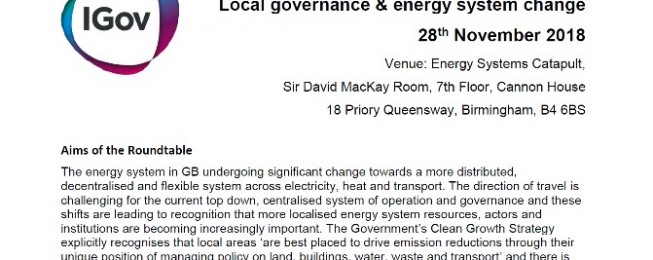The energy system in GB undergoing significant change towards a more distributed, decentralised and flexible system across electricity, heat and transport. The direction of travel is challenging for the current top down, centralised system of operation and governance and these shifts are leading to recognition that more localised energy system resources, actors and institutions are becoming increasingly important. The Government’s Clean Growth Strategy explicitly recognises that local areas ‘are best placed to drive emission reductions through their unique position of managing policy on land, buildings, water, waste and transport’ and there is increasing focus on the role of local coordination in whole system, integrated approaches to decarbonisation. However, although there is extensive local experimentation in low carbon energy, governance structures to shape and co-ordinate local energy systems are limited. The role of DNOs is set to transform as they become more active managers of networks and enablers of flexibility, local authority action on energy varies greatly across the country, and both devolution deals and Local Enterprise Partnerships are increasingly focussing on energy. Recognising these multiple developments, and the increasing strategic focus on local energy, this roundtable event seeks to explore how the role of local actors in energy systems is changing, the extent to which current governance, policy and regulatory arrangements support action by the most appropriate actors at the right scale, and how action between local, regional and national governments should be best coordinated. Experts and policymakers will discuss these issues, through a range of focussed presentations and facilitated discussion, across two sessions.
Session 1: How is the role of local actors and institutions changing and where do they play a key role?
Questions to consider:
- When and where is local action important in energy system change – where do local actors add value as the most appropriate locus for action?
- Who are the most appropriate actors and how will these change from area to area?
- To what extent do current policies, governance and regulatory arrangements support local coordination of energy system change?
Session 2: What could a new or amended framework for local energy look like?
Questions to consider:
- Is there a need to develop new or amended institutional relationships between national, regional and local energy system actors?
- What might a future framework for governing energy systems at a local scale look like?
- What are the gaps in knowledge and research needs in order to better understand energy system integration across scales?
The roundtable context and agenda can be downloaded here: Local governance roundtable 281118 – final
Related Posts
« Previous New Thinking: Fuel poverty indicator letting down poorer households New Thinking: The changing role of cities & local energy Next »







